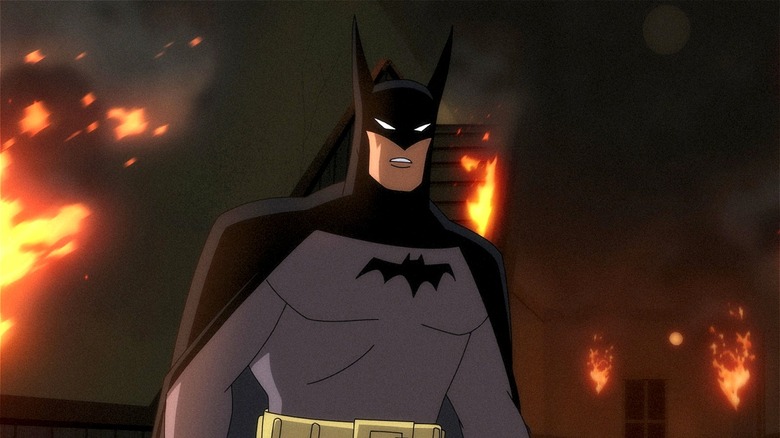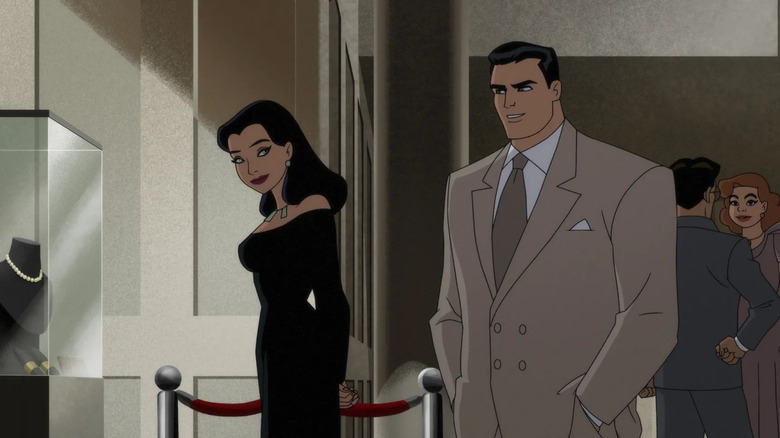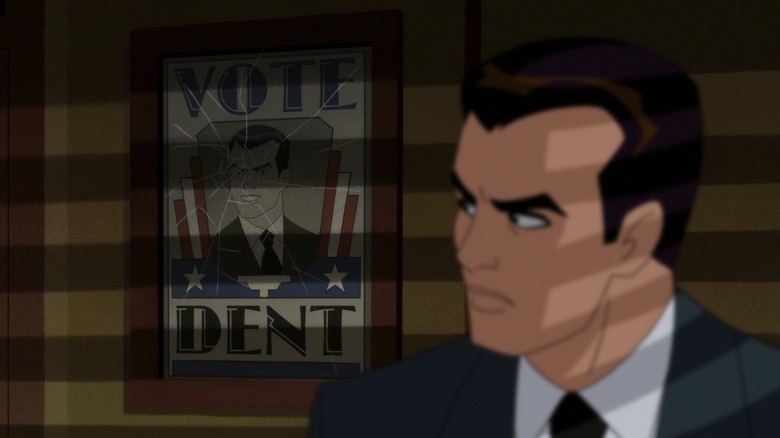Batman: Caped Crusader Review - The Dark Knight Strikes Again
- Interesting takes on classic villains
- Strongest when it leans into horror and psychological drama
- Brief season leaves things underdeveloped
- CG effects don't fit the style
So many writers, artists, and actors have reinterpreted Batman over the decades that it's impossible to name a "definitive" take on the character. For many fans, however, "Batman: The Animated Series" comes awfully close. The '90s cartoon, developed by Bruce Timm and Eric Radomski, had a little something for everyone: action, humor, terror, tragedy, thrills, smarts, and style to spare. Characters the series invented, like Harley Quinn and Renee Montoya — or reinvented, like a much more sympathetic Mr. Freeze – became part of the mainline DC canon. Timm would expand upon the DC Animated Universe with "Superman: The Animated Series," "Batman Beyond," and "Justice League/Unlimited," and actors Kevin Conroy and Mark Hamill continued to voice Batman and the Joker in many more projects.
"Batman: Caped Crusader," co-created by Timm, J.J. Abrams, and "The Batman" director Matt Reeves, echoes aspects of "Batman: The Animated Series" — the noir influences, the Art Deco backgrounds — but rather than an "X-Men '97"-style continuation of the old show, this is part-reinvention, part-return to the source. If "Batman: The Animated Series" was an amalgamation of every prior comics era, "Caped Crusader" plays heavier on the weird edges of Bob Kane and Bill Finger's earliest Batman comics. Instead of a "timeless" blend of anachronisms, its Gotham exists firmly within a fantasy version of the 1940s. Working without the restraints of episodic children's television, this more adult-oriented cartoon can tell stories its predecessor couldn't — though modern streaming programming comes with its own restraints, holding "Caped Crusader" back from its full potential.
Classic characters done differently
Voiced by Hamish Linklater, the "Batman: Caped Crusader" version of the titular hero is a colder figure than Kevin Conroy's from the DCAU. While not as extreme as Robert Pattinson's flat-out weirdo Batman, he's very much a loner — both his shallow Bruce Wayne and mysterious Batman personas keep everyone at a distance. Over the course of the season, he's only starting to develop his working relationships with police commissioner Jim Gordon (Eric Morgan Stuart), not-yet-Batgirl defense attorney Barbara Gordon (Krystal Joy Brown), and detective Renee Montoya (Michelle C. Bonilla).
While more serialized than "Batman: The Animated Series" ever was, "Caped Crusader" still knows the value of a good "villain of the week" adventure (a phrase used loosely, given Prime Video is releasing every episode at once on the same day), and has fun with reinventing classic rogues and bringing more obscure ones to the spotlight. This show's version of Clayface (Dan Donohue) splits the difference between the mask-wearing actor of the Golden Age comics and the shapeshifter of popular later versions with some grounded-enough mad science. Catwoman (Christina Ricci) is now an upper-class kleptomaniac and comic foil for Bruce Wayne as opposed to an antihero from the underclass. The Penguin gets one of the most radical reinventions — I'm not sure I can even say who the voice actor is without giving spoilers, but it's sure to spark discourse.
A side-note on the discourse: of course the usual suspects are gonna whine about the show's diverse cast. That conversation's boring. What I'm more interested in is how everyone else feels about the way this diversity does or, more notably, doesn't seem particularly affected by the period setting. I noticed maybe one line alluding to the pressures this Commissioner Gordon faces as a Black man in a position of power; otherwise, racism appears to be a non-issue, and homophobia likewise seems surprisingly nonexistent in this version of the 1940s. On one hand, I get the appeal of making these non-issues; on the other, I wonder if there are missed opportunities. (I just caught up on AMC's "Interview With the Vampire," an outstanding model for addressing issues of identity when diversifying period stories without overwhelming everything else.)
Anyway, getting hung up on historical accuracy is all a moot point when "Caped Crusader" goes into full-on supernatural territory. When Gentleman Ghost (Toby Stephens) shows up robbing people midway through the season, the scientifically minded Batman doesn't know what to do — this episode is Alfred's (Jason Watkins) time to shine. This show plays well with horror, and perhaps the best episode of the season is the one with the vampire Nocturna (McKenna Grace). A showcase for Batman's capacity for empathy, it's the closest "Caped Crusader" gets to the full-on "Baby-Doll"-style tearjerkers of "The Animated Series."
Not enough episodes to do everything justice
Two major supervillains get longer ongoing arcs this season: Harleen Quinzel aka Harley Quinn (Jamie Chung) and Harvey Dent aka Two-Face ("Brave and the Bold" Batman actor Diedrich Bader). Harley is now Bruce Wayne's therapist instead of the Joker's, and her psychoanalysis gets into kinkier territory than "Batman: The Animated Series" would ever have been allowed to tackle. I loved this version of the character, and even those who find Harley overexposed at the moment might be intrigued by this more intimidating take. My one complaint about her story arc is that I wanted more of it; we leave her (for now) halfway through an already too-short 10-episode season.
Dent's transformation into Two-Face gets more build-up over the course of the entire season, as the lawyer navigates the utter corruption in Gotham's justice system and gets corrupted into a villain himself. It's the "safest" take on any of the villains in the series; if you've seen or read any other Two-Face story, you basically know what you're getting here, but the reason this story is so familiar is because it works. The season finale, written by comic author Ed Brubaker, hones in on Dent's tragic nature in dramatically satisfying ways.
Animation-wise, "Batman: Caped Crusader" looks better than "The Animated Series" at its worst but nowhere near as stunning as that show at its best. Where "The Animated Series" emphasized fluid movement and broad expression to varied results depending on the animation studios for each episode, "Caped Crusader" is more consistent but more restrained, appealingly designed but a bit stiff in comparison. The biggest visual downside to "Caped Crusader" comes from the CG car chases — maybe they'd work with a different art style, but they stick out in a bad way here.
"Batman: Caped Crusader" kept my interest and excitement throughout without quite touching the "wow" factor that Bruce Timm's past animated series have achieved at their best moments. One rather brief season in, this show is just getting started. I'm glad a second season is already in the works and hope it has a chance to keep building from here.
"Batman: Caped Crusader" premieres on Amazon Prime Video on August 1.


